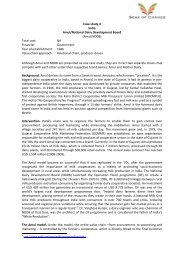Collection of Case Studies 2. - Seas of Change Initiative
Collection of Case Studies 2. - Seas of Change Initiative
Collection of Case Studies 2. - Seas of Change Initiative
Create successful ePaper yourself
Turn your PDF publications into a flip-book with our unique Google optimized e-Paper software.
where the private sector and farmers will play an important role. Since 2011, IPER’s approach attracted anumber <strong>of</strong> stakeholders who want to learn about value chain development and cluster approach. The Ministry <strong>of</strong>Agriculture sees the approach as revolutionary. The Ministry <strong>of</strong> Commerce and Industry is planning to use thecluster approach to allow cooperative to access to market and finance. Thus, the IPER is now becoming areference for the Government <strong>of</strong> Rwanda in farmer entrepreneurship. The Agri-business cluster approach is alsoattracting RAB (Rwanda Agriculture Board) to be used in agriculture extension and innovation in the country.However, in taking up the IPER at the national level, some risks might be limited financial resources and the lessinvolvement <strong>of</strong> the private sector, with a predominant role <strong>of</strong> the Government.4. Impact on farmer entrepreneurshipOne key achievement <strong>of</strong> the IPER program is a remarkable increase <strong>of</strong> entrepreneurship among farmers. Theynavigate businesses as other entrepreneurs by:- Formulating objectives related to their farm businesses, in terms <strong>of</strong> production increase, improvingquality <strong>of</strong> productions/ seeds, starting processing the production, storage, turnover, market share, etc.- In solving burning questions, farmers work with other stakeholders to get more access to market, aregetting linked to financial institutions, get access to seeds and other extension services.- Entrepreneurship skills increase as the farmers strive to achieve their objectives. They innovate, seeknew market opportunities, take risks, etc.The impact <strong>of</strong> the basket fund on entrepreneurship development is very important. With a € 300,000,30 agri-business clusters have achieved a lot:- 10 clusters got new markets, and their margins increased by 20%. Contract farming is used in 3clusters and exports to Congo and Uganda are opportunities explored during the last two years.- 8 enterprises have improved quality <strong>of</strong> seeds- Production increased in all clusters- 2 Financial institutions developed new financial products to needs expressed by farmers- 5 cooperatives have developed new products,- 20 producer organizations have accessed to loan after coaching in business plan prepa ration. Theamount <strong>of</strong> loan is about € 1,000,000- 3 farmer organizations initiated their processing companies. One rice cooperative managed to getother chain operators as co- shares in a new rice processing miller.5. What are the key implications for scaling inclusive business?What are the lessons learnt regarding large-scale inclusive business development?- Have several pilots at the same time and organize cross learning between them,- Organize cooperation between all stakeholders, especially between donors and the government- Assure local ownership, avoiding donors with “spending pressure”.- NGO’s and people used to be helped by NGO’s, need time to realize what “entrepreneurship” is about.This paradigm shift needs ample attention at the level <strong>of</strong> information and training. Once people ‘get it’,the effect can be tremendous.What aspects <strong>of</strong> your approach might be usefully adapted to other large-scale initiatives? What arethe lessons that could be transferred to other upscaling initiatives? (adaptable innovations)- Define clusters <strong>of</strong> real-life actors who are interdependent to achieve results.- Put them together in a multi-actor workshop to discuss targets and “burning issues” to improvefunctioning <strong>of</strong> their value chain and increase pr<strong>of</strong>its for all ( win-win solutions)- Train and coach a pool <strong>of</strong> neutral facilitators who can be “hired” by a group <strong>of</strong> cluster-actors to facilitatethese value-chain improvement processes.- Put in place a demand driven basket-fund from which necessary actions can be financed easily with alight and quick procedure.55







